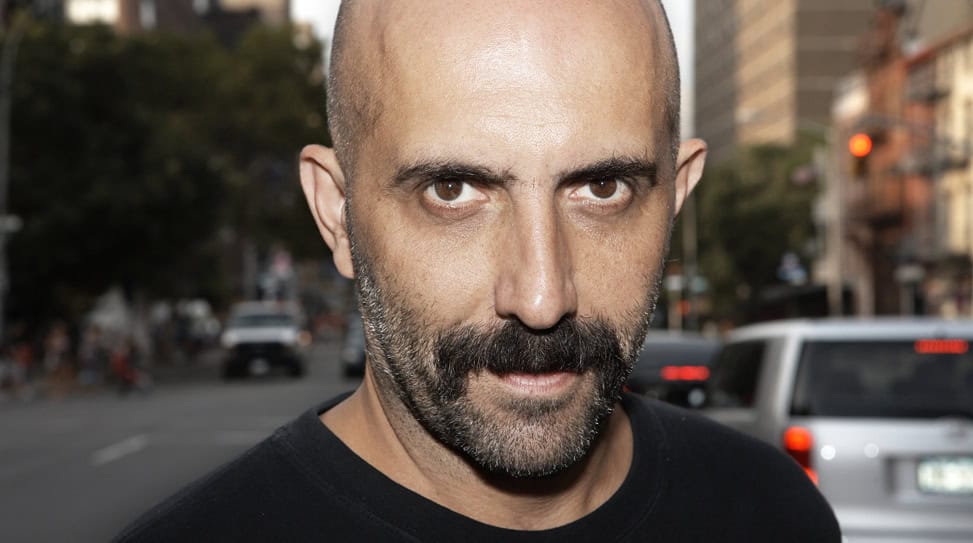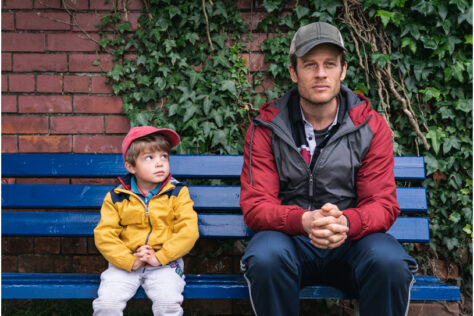Gaspar Noé is something of a filmmaker’s filmmaker. For one thing, the 46-year-old provocateur never sells himself short. He’s not pinned down by box office woes and doesn’t try to woo his way into conservative film circles. Remember the brutal 9-minute rape scene in his 2002 film? Sienna Miller put it thusly: “I couldn’t watch Irreversible. I was traumatized. I like to act to feign shock because it’s what you’re supposed to do but actually, deep down, it’s not that shocking. Irreversible was a shocking and brutal film.”
There’s always been a core seriousness about Noé, but as much as he likes to stir up controversy, most critics respect him—be there any doubt—on the strength of his filmmaking credentials. Keeping in character, he’s about to trip out cinemagoers again with the arrival of Enter the Void, a brilliant psychedelic melodrama that has had a polarizing effect at Cannes, Toronto, Sundance and SXSW. The film gets its limited release in New York, Los Angeles and Chicago on September 24 with a national rollout to follow.
Anthem briefly caught-up with the French visionary at the Bowery Hotel in New York last month prior to a special screening of Enter the Void at the Walter Reade Theater.
So you’ve experimented with a lot of drugs then?
[Laughs] Of course! But I’ll add that I’ve experimented more with sex than drugs. I’m a curious guy. I was 14 when I smoked my first joint and I smoked a lot of it until I was 17. And then I did some acid, mushrooms and MDMA. I think that’s common for a lot of teenagers if you look at the nightlife in Paris and elsewhere—just lots of dancing, tweaking out and having sex. I didn’t mold the Oscar character in Enter the Void after myself, but I know so many people in real life who are just like him.
Did your own drug trips influence the overall look and feel of Enter the Void?
The style is definitely reflective of the hallucinations I’ve had. It was about recreating those visuals to people who’d never done drugs before. When I was trying to get this film financed, I had to describe the images, make drawings and pull visual references from films like TRON to get the idea across. I think the only person who can translate what it’s like to be on drugs on film is someone who’s experimented with drugs themselves. I spoke to a lot of people who told me that the movie reminded them of their own drug trips—it made them want to do it again. There were obviously other people who’d say, “Thanks for making this movie because now that I know what it’s like, I never want to touch drugs.”
Was it very difficult securing financing for this film?
Yes. That’s why there’s such a huge gap between this and Irreversible. I really wanted to do Enter the Void after Irreversible. Shooting an experimental movie that deals mostly with drugs in Japan with unknown actors made it incredibly difficult to secure financing.
I think it was wise casting unknowns for this.
Nathan [Brown] was just sitting here next to me. He played Oscar.
No way! I didn’t even recognize him.
He looks a lot different now. You also don’t see very much of his face in the movie, so… [Laughs] The casting director knew I was looking for someone with a long face who resembled Paz [de la Huerta] and she had done a photo session with Nathan. When I first met him, I found him to be very intelligent and he told me that he wanted to become a music video director. I wasn’t so into the idea of casting a real actor for this because they bring egos with them. I’m sure they would’ve had issues with me not showing their face for the majority of the film.
Did the screenplay go through a lot of changes during development?
It started out as a short film, actually. Then it turned into a feature and I was going to shoot it in France. There was another version that was supposed to be shot in New York City. In the very first draft of the script, the story wasn’t even told from the first person perspective where you see the world through Oscar’s eyes.
That was an interesting stylistic choice. Why do we never see Oscar’s face apart from one or two instances?
To portray the hallucinations in a very authentic way, I thought that it would only make sense to tell the story from Oscar’s perspective. It wouldn’t make sense to have the audience as outsiders looking in. It’s meant to be a personal trip. I think you’re able to identify with a main character better if their eyes become your eyes. Also, the movie is about someone’s soul coming out of their body. It just makes sense that it’s Oscar’s perspective when he’s soul leaves his body and he’s having this surreal out of body experience.
What was it like shooting in Tokyo?
It was great. Everyone was so passionate. I now have trouble shooting back in Europe or even in America because you can’t count on people to work 14 hours a day, six days a week. The crew in Japan was so dedicated to the project. It’s hard to shoot a movie like this anywhere else.
How much of the film would you say was manipulated in post?
Pretty much the entire film.
There are certain shots in the film where Tokyo looks like a miniature. It’s really unique.
The shots over Tokyo were filmed from a helicopter and then we rearranged the landscape to make it look like a fake Tokyo. But it’s all real footage. We digitally rearranged everything to make it look like a model.
I don’t want to spoil anything for people who haven’t seen the film, but can you comment on the scene with the car accident that’s shown repeatedly? Everything considered, that was probably the most frightening thing to watch.
If you want to show trauma, you have to show it in a very traumatic way. That’s why you have to be over 16 to watch this film in France. It’s not about the drugs or the sex; it’s scenes like that that might be too much for younger audiences to handle.
What was it like screening the film at Cannes last year?
We screened the film in its unfinished form, which was very risky. It felt like we were going to the World Cup without t-shirts because our t-shirts weren’t ready. You feel naked, but you still enjoy it. There’s so much history there. The version that will be released in America is going to be 17 minutes shorter, actually. There’s a European cut and an American cut. The European cut has an additional reel.
Are you currently working on a new project?
I have a treatment, but I’m not quite ready to start talking about it yet.

 About a Boy: James Norton
About a Boy: James Norton Clarion Call: Garrett Hedlund
Clarion Call: Garrett Hedlund
No Comments